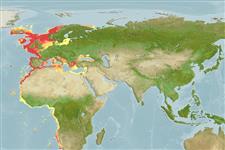分类 / Names
俗名 | 同种异名 | Catalog of Fishes(属, 种) | ITIS | CoL | WoRMS | Cloffa
Elasmobranchii
板鳃亚纲 (鲨鱼与 鱼) (sharks and rays) >
Rajiformes (Skates and rays) >
Rajidae (Skates)
Etymology: Raja: Latin, raja, -ae = a sting ray (Raja sp.) (Ref. 45335).
More on author: Linnaeus.
Environment: milieu / climate zone / depth range / distribution range
生态学
海洋 居于水底的; 深度上下限 5 - 1020 m (Ref. 114953). 亞熱帶的; 70°N - 38°S, 25°W - 50°E
Eastern Atlantic and Southwest Indian Ocean: Iceland to Madagascar, including the Mediterranean Sea.
東大西洋: 冰島,挪威, 北海與波羅海西部向南至摩洛哥與那米比亞, 包括地中海與黑海。 雖然記錄自非洲南部, 在區域的它的狀態不確定.(參考文獻 5578)
Length at first maturity / 大小 / 重量 / 年龄
Maturity: Lm 76.6, range 47 - 87.5 cm
Max length : 105 cm TL 雄鱼/尚未辨别雌雄; (Ref. 53748); 139.0 cm TL (female); common length : 85.0 cm TL 雄鱼/尚未辨别雌雄; (Ref. 9987); 最大体重: 18.0 kg (Ref. 35388); 最大年龄: 15 年 (Ref. 41305)
背棘 (总数) : 0; 臀棘: 0. Sub-rhomboid in shape with pointed wing-tips; disc-width 1,25 to 1,36 times in its length, its length 1,70 to 1,83 times in total length. Short rostrum, rounded at his extremity; pectoral fins with clear angles on lateral side; triangular pelvic fins (Ref. 39246). Dorsally prickly; large females also prickly throughout their ventral surface; juveniles and large males prickly along the margins of their discs and the underside of their snout. 30-50 thorns form a median row from the nape to the first dorsal fin; additional large 'buckler' thorns with swollen bases scattered on upper surface of disc in adults (Ref. 3167). Coloration is highly variable, with the dorsal surface having all shades of brown with dark and light spots and blotches; ventral surface white (Ref. 3167, 58137).
上表皮长满刺的, 下面长满刺的在大的雌鱼中, 只有吻与体盘边缘当幼鱼时与大的雄性; 眼窝的刺分开,30-50 在中央的从后颈到第一背鳍的列中; 附加的大 '圆盾' 刺用肿大的基底散布在体盘上表面上当成鱼时。 (参考文献 3167) 接近长斜方形的体盘, 体盘-宽度 1,25 到 1,36 倍于体长, 它的长度 1,70 到 1,83 倍全长; 短喙,在他的末端圆的; 在侧面的侧边上胸鳍有清澈的角; 三角形的腹鳍.(参考文献 39246) 上表皮非常可变的, 所有的有褐色阴影, 杂色的具有深色与淡色的斑点与斑块, 腹面白色的.(参考文献 3167)
Inhabits shelf and upper slope waters. Reported depth ranges varies, from 10-300 m (Ref. 4426, 82319, 88187), and from 300-577 m in the eastern Ionian Sea (Ref. 56504); most common in coastal waters between 10-60 m depth (Ref. 58137). Tolerates low salinities (Ref. 88171). Found on mud, sand and gravel bottoms, rarely on rougher bottoms (Ref. 6808, 58137). Nocturnal species. Feeds on all kinds of bottom animals, preferably crustaceans (Ref. 3167) and fishes (Ref. 114953). Undertakes migrations with mean distances of 54-117 km per month; shows a clear annual migration cycle (Ref. 89017, 89018), moves from deeper offshore waters (10-30 m) in autumn and winter to shallower areas (<10 m) in spring (Ref. 82319). Young are non-migratory, inhabiting inshore nursery grounds (Ref. 89019, 89020, 89022); in the Bay of Douarnenez (France) they are found to remain in shallow waters for at least 2 years (Ref. 89023). Maturity age 7-8 years (Ref. 114953). Oviparous. Young may tend to follow large objects, such as their mother (Ref. 205). Detects weak electric fields generated by other organisms (prey detection and predator avoidance) but may also generate its own weak electric fields (Ref. 10311, 88171). Utilized fresh and frozen (Ref. 9987).
栖息于大陆棚与上层斜坡水域从海岸的线到大约 300 公尺。 来自 20-300 公尺 (参考文献 4426) 的深度范围, 与从 300-577 公尺在爱奥尼亚的海洋东部中.(参考文献 56504) 栖息于沙子与砂岩底了。 (参考文献 6808) 捕食各种的底部动物, 可能地甲壳动物.(参考文献 3167) 卵生的。 明显的成对出现。 幼鱼可能倾向跟随大的个体, 例如他们的母亲.(参考文献 205) 卵为长方形鞘囊具有僵硬的触角沈积在沙滩或泥滩的角落.(参考文献 205) 卵鞘是 5.0-9.0 公分長與 3.4-6.8 公分寬的.(參考文獻 41250) 生鮮使用與冷凍.(參考文獻 9987) 大約 52-170個卵在一年中每個體生產。 (參考文獻 41250) 給雄魚的最大長度是 105 公分TL 。 (參考文獻 41333)
Oviparous. Distinct pairing with embrace. Polyandrous species (Ref. 89024). Paired eggs are laid and deposited on shallow sand, mud, pebble or gravel bottoms (Ref. 205, 89025). Up to 170 egg cases can be laid by a single female in a year (Ref. 3167), but average fecundity is much lower (around 48-74 eggs) (Ref. 3603, 31302). In northwestern Europe, egg cases are laid during spring (Ref. 3167) and in the Mediterranean during winter and spring (Ref. 3167). Egg cases are oblong capsules with stiff pointed horns at the corners, each containing one embryo (Ref. 205). Capsules are 5.0-9.0 cm long without the horns (Ref. 41250, 88187) and 3.4-6.8 cm wide (Ref. 41250). Egg cases are anchored with an adhesive film (Ref. 82399). Embryos feed solely on yolk (Ref. 50449). Egg cases hatch after about 4-5 months and pups are about 11-13 cm TL (Ref. 88864). Mating season from February to September, peaking in June (Ref. 74501). Adults observed to form same-sex aggregations during the mating season with females moving to shallower inshore waters approximately a month before the males (Ref 3603, 58137, 74501). Mating does not occur in the Baltic Sea (Ref. 82311).東大西洋: 冰島,挪威, 北海與波羅海西部向南至摩洛哥與那米比亞, 包括地中海與黑海。 雖然記錄自非洲南部, 在區域的它的狀態不確定.(參考文獻 5578)
McEachran, J.D. and K.A. Dunn, 1998. Phylogenetic analysis of skates, a morphologically conservative clade of elasmobranchs (Chondrichthyes: Rajidae). Copeia 1998(2):271-290. (Ref. 27314)
人类利用
渔业: 商业性; 游钓鱼种: 是的
工具
特别资料
下载 XML
网络资源
Estimates based on models
Preferred temperature (Ref.
123201): 7.1 - 15.8, mean 10.7 °C (based on 474 cells).
Phylogenetic diversity index (Ref.
82804): PD
50 = 0.5000 [Uniqueness, from 0.5 = low to 2.0 = high].
Bayesian length-weight: a=0.00200 (0.00175 - 0.00228), b=3.26 (3.23 - 3.29), in cm total length, based on LWR estimates for this species (Ref.
93245).
营养阶层 (Ref.
69278): 3.8 ±0.2 se; based on diet studies.
Generation time: 7.8 (5.4 - 10.4) years. Estimated as median ln(3)/K based on 16
growth studies.
回复力 (Ref.
120179): 低的, 最小族群倍增时间4.5 - 14 年 (K=0.09-0.14; tm=10; tmax=23; Fec=150).
Prior r = 0.18, 95% CL = 0.12 - 0.26, Based on 4 full stock assessments.
Fishing Vulnerability (Ref.
59153): High vulnerability (60 of 100).
Climate Vulnerability (Ref.
125649): High vulnerability (60 of 100).
Nutrients (Ref.
124155): Calcium = 9.22 [1.18, 176.74] mg/100g; Iron = 0.628 [0.060, 7.651] mg/100g; Protein = 17.2 [14.4, 19.5] %; Omega3 = 0.571 [0.265, 1.295] g/100g; Selenium = 39.7 [7.5, 183.1] μg/100g; VitaminA = 5.22 [0.40, 59.91] μg/100g; Zinc = 0.47 [0.03, 5.30] mg/100g (wet weight); based on
nutrient studies.
